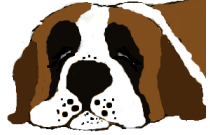![]() Saints in Wales
Saints in Wales
![]()
**********************************************************************
Life With A Saint

In The House
The first thing most people notice about a house where St Bernards live is fluff, fluff, and more fluff! Saints are nearly always moulting and even when they're not moulting they're moulting! It gets everywhere - expect to find it not only on your clothes, furniture, carpets and bedding but also on any food substance that has been in the house for more than 2 seconds! If you don't like fluff in your house then get a short-coated St Bernard.
And then of course there's the slobber. If your dog lives in the house with you then woodchip or artex on the walls is advisable - you can just paint over the dried on slobber and the pattern blends in.
Space is not as much of a problem as many would think, St. Bernards sleep a lot of the time so as long as there's room for your dog to lie down and for you to step over or around him then there's no need to worry. (When you do step over them of course, this is the time that your Saint decides he's going to stand up and you end up being tossed like a pancake onto the kitchen floor) When he does eventually get up and move around then you will of course need a bit of space - St Bernards are incredibly clumsy and will think nothing of walking head-first into your nice antique dresser which, of the two, will come off worse from the encounter!
I know a few Saint owners who let their dogs sleep on the bed with them, I choose not to, for the simple reason that with the constant ear-deafening snoring I would never get any sleep myself!
Saints are usually good with other animals (ours share the house with 3 cats and numerous other furry critters without any problem) and children. When they can be bothered to wake up and get up, they can also be good guard dogs but woe betide anyone who decides to break into our house carrying a traffic cone - my two are terrified of them!
In The Yard / Garden
Saints like being outside come rain or shine, rain is preferable as then they can come inside to shake themselves dry. A yard is preferable to a garden as all the pee can be hosed down the drain - a lawn will soon be yellowed and flattened. A large bucket of water can be kept outside for drinking but should be washed and cleaned every other day as the bottom couple of inches soon turns into a mixture of slobber, bits of biscuit and anything that your Saint happened to have in his mouth in the previous 24 hours.
Out For Walkies
St. Bernards do not need as much exercise as some people think. They are happy with between 20 and 40 minutes exercise each day and whilst they have the staying power to go for miles, this will more than likely be at a sure and steady pace rather than a fast run.
Take lots of pooper-scoopers with you and expect to carry back a bit more weight than you started out with. Also take some biscuits or treats for rewards when your Saint has been good or as bribes for when you want him to be good.
I also take a small piece of towel - Saints like to say hello to people and people often like to say hello to them, once the pleasantries are over with you can offer the person the bit of towel to wipe off the slobber.
Meeting People
St. Bernards are people dogs - they like being with people and they love meeting new people. There are a number of things that people will be guaranteed to say....
1) "How much does he weigh? " It's a good idea to know your Saints weight, we weigh ours on an old railway parcel scales but your vet will probably have something like a sheep scales. This knowledge is useful not only for impressing people but also when it comes to veterinary treatment which may need dosages calculated by weight.
2)" I bet he eats you out of house and home!" My usual answer to this one is "It's not too bad because they don't do an awful lot so the intake requirements aren't as high as you might think". You of course will know different from the times when you have returned home to your Saint unable to find the bar of soap/ toilet roll/ wellington boot/ doorframe that was there when you left.
3) "You could put a saddle on him and ride him round." By the fourth time you have heard this you will know to laugh and say "yes".
4) "Where's the barrel?" Buy one, it saves the hassle!
5) "I bet he takes you for a walk doesn't he?" Two possible answers here, first is "Yes!", second is "No, my dog is very well trained and behaves himself impeccably on the lead"
Other questions will be "Is he fully grown?", "Does he slobber a lot? Is it horrific?" "They rescue people don't they?" "How much was he to buy?" "Where did you get him from?" and others which you will hear many times throughout the day.
Basically, life with a Saint Bernard is wonderful, they are very loving and trustworthy and I'm sure that they have a built-in sense of humour which can sometimes lead to hilarity and sometimes lead to exasperation. They're easy dogs to live with, requiring little exercise compared to some other breeds.
Yes, they slobber, yes they require a fair bit of grooming and yes they can be very clumsy at times, but the love your Saint gives you has no bounds, you feel safe when out with your Saint at night and they make terrific draught excluders!